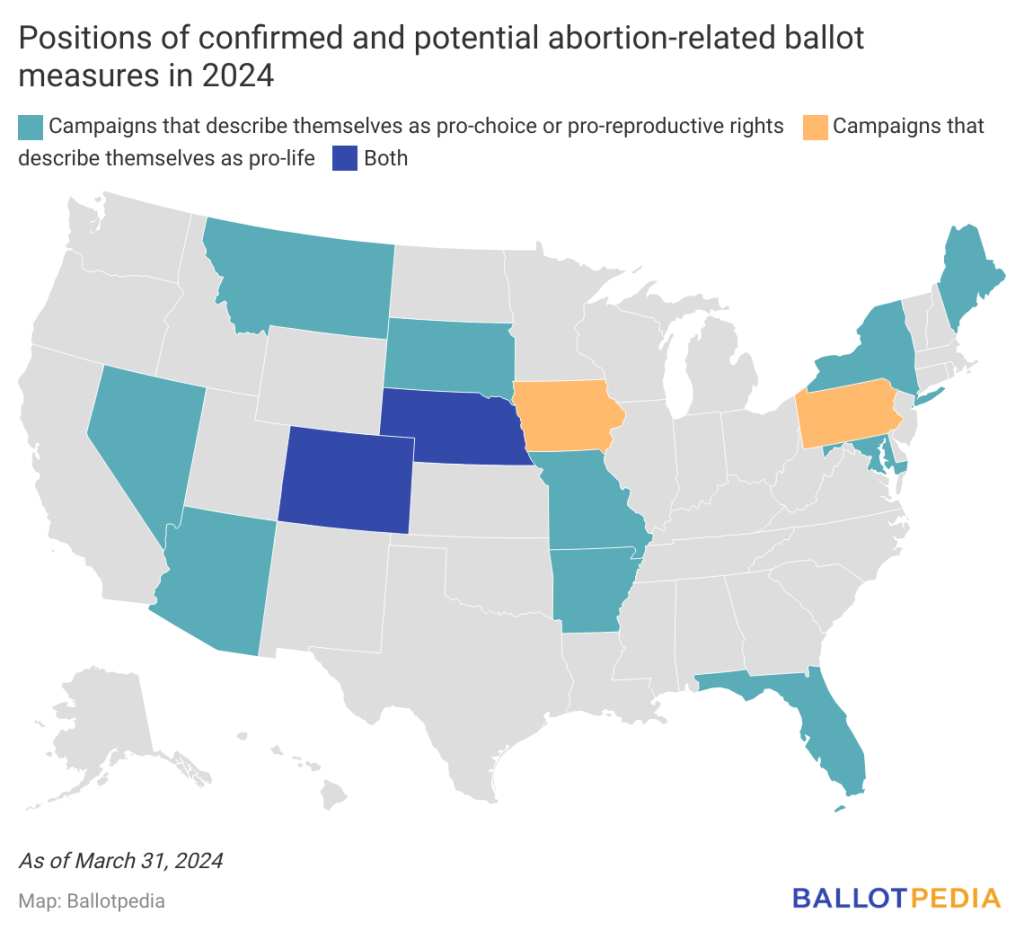In Nov., voters in three states—Florida, Maryland, and New York—will decide on ballot measures related to abortion.
Florida is the most recent state to join that list. While signatures were verified on Jan. 5, 2024, the state Supreme Court needed to review the initiative. On April 1, the court ruled that the initiative met the state's requirements to appear on the ballot.
The court's order on the ballot measure was released at the same time as a ruling on abortion laws in Florida. Justice Jamie Grosshans, writing the court's opinion, said the state's Privacy Clause, approved in 1980, did not include a right to abortion, which was a change from a previous ruling in 1989. Grosshans wrote, "We recede from our prior decisions in which — relying on reasoning the U.S. Supreme Court has rejected — we held that the Privacy Clause guaranteed the right to receive an abortion through the end of the second trimester."
At least 14 other potential measures could appear on the ballot in 11 states.

Below is the list of certified measures that will appear on the ballot, as well as potential measures that could appear on the ballot in 2024.
Certified abortion-related ballot measures in 2024
Florida
Amendment 4 would provide a constitutional right to abortion "before viability or when necessary to protect the patient’s health, as determined by the patient’s healthcare provider."
- Current law: On April 1, 2024, the Florida Supreme Court ruled that the state constitution's right to privacy does not include the right to abortion, overturning a previous decision by the court in 1989 that found that the privacy clause did include a right to abortion. The ruling allowed the state's 15-week abortion ban, passed by the legislature in 2022, to take effect. In 2023, the legislature passed another bill, known as the Heartbeat Protection Act, to ban abortion at six weeks, which was contingent on the state supreme court overturning its prior ruling and allowing the 15-week ban to take effect. The six-week ban will take effect on May 1. Before 2022, abortions were legal in Florida until 24 weeks.
- Measure type: Initiated constitutional amendment
- Measure support: Floridians Protecting Freedom is leading the campaign supporting the initiative. Supporters include the ACLU of Florida, League of Women Voters of Florida, and Planned Parenthood of Southwest and Central Florida.
- Measure opposition: Florida Voice for the Unborn is leading the campaign in opposition to the initiative. Opponents include Susan B. Anthony Pro-Life America, the National Center for Life and Liberty, and Florida Voters Against Extremism.
- State political context: Florida currently has a Republican trifecta. In the previous presidential election in 2020, Donald Trump (R) won with 51.22% of the vote.
Maryland
Maryland voters will be deciding a constitutional amendment that would guarantee a right to reproductive freedom, including the ability to prevent, continue, or end one's own pregnancy. The ballot measure is designed to prohibit the constitutional right from being denied or infringed unless there is a compelling state interest, which would need to be achieved using the least restrictive means.
- Current law: Currently, abortion is legal in Maryland until viability. Abortion is legal after viability if the woman's life or health is endangered or there is a fetal anomaly.
- Measure type: Legislatively referred constitutional amendment
- Measure support: Freedom in Reproduction Maryland is leading the campaign supporting the amendment. Supporters include Gov. Wes Moore (D), Lt. Gov. Aruna Miller (D), the Maryland AFL-CIO, and the Maryland State Education Association.
- Measure opposition: Health Not Harm MD is leading the campaign against the amendment. Opponents include the Maryland Catholic Conference, the Maryland Family Institute, and the Maryland Right to Life PAC.
- State political context: Maryland currently has a Democratic trifecta. In the previous presidential election in 2020, Joe Biden (D) won with 65.36% of the vote.
New York
New York voters will decide on a constitutional amendment to prohibit the denial of a person's rights based on the person's "ethnicity, national origin, age, [and] disability," as well as the person's "sex, including sexual orientation, gender identity, gender expression, pregnancy, pregnancy outcomes, and reproductive healthcare and autonomy." The measure was referred to the ballot by the New York State Legislature.
- Current law: New York allows for an abortion up to 24 weeks of pregnancy. Abortion is permitted after 24 weeks if, as determined by a health care practitioner, the fetus is not viable or the pregnant woman's life or health (including mental health) is at risk.
- Measure type: Legislatively referred constitutional amendment
- Measure support: New Yorkers for Equal Rights is leading the campaign to support the amendment. Supporters include Gov. Kathy Hochul (D), U.S. Sen. Kirsten Gillibrand (D), the League of Women Voters of New York, and the Planned Parenthood Action Fund.
- Measure opposition: Opponents of the amendment include the New York State Catholic Conference.
- State political context: New York currently has a Democratic trifecta. In the previous presidential election in 2020, Joe Biden (D) won with 60.87% of the vote.
Potential abortion-related ballot measures in 2024
Arizona
The campaign Arizona for Abortion Access is working to place a constitutional amendment on the ballot that would establish a state constitutional right to abortion that the state may not interfere with before the point of fetal viability.
- Number of signatures needed: 383,923 valid signatures. Arizona for Abortion Access said it gathered 506,892 petition signatures on April 2, 2024
- Signature deadline: July 4, 2024
Arkansas
The Arkansans for Limited Government campaign is working to place a constitutional amendment on the ballot that would prohibit laws or policies restricting abortion access within 18 weeks from conception; in cases of rape, incest, or fatal fetal anomaly; or when abortion is needed to protect the life or health of the mother as determined by a physician.
- Number of signatures needed: 90,704 valid signatures
- Signature deadline: July 5, 2024
Colorado
Colorado voters may decide on an initiated state statute that would define living human child as a human being beginning at conception. It would prohibit abortion, provide for law enforcement, and provide penalties for individuals and facilities that perform abortions or provide surgical tools or medications to perform abortions.
- Number of signatures needed: 124,238 valid signatures
- Signature deadline: Aug. 5, 2024
Colorado voters may also decide on a ballot initiative that would prohibit the state or local governments from denying or impeding the right to an abortion and allow abortion to be a covered service under health insurance plans.
- Number of signatures needed: 124,238 valid signatures
- Signature deadline: Aug. 5, 2024
Iowa
The Iowa State Legislature may refer a constitutional amendment to the ballot that would state that the constitution does not provide a right to abortion or require the funding of abortion. The amendment already passed in the 2021-2022 session, and needs to pass again in the 2023-2024 session. The Iowa State Legislature has a Republican majority in the House and Senate.
- Majority requirement needed: Simple majority in both chambers of the state legislature in two consecutive legislative sessions.
Maine
The Maine State Legislature may refer a constitutional amendment to the ballot to provide a state constitutional right to personal reproductive autonomy. The amendment was introduced to the Maine State Senate as Senate Bill 780 and has yet to pass either chamber. On April 1, the measure failed to pass the Senate with a vote of 20-13 (24 yes votes were needed for the measure to pass).
- Majority requirement: A two-thirds majority (66.67%) vote of the state legislature during one legislative session. Both the House and Senate in Maine have a Democratic majority.
Missouri
The Missourians for Constitutional Freedom campaign is working to place a constitutional amendment on the ballot that would provide the right to reproductive freedom, and provide that the state legislature may enact laws that regulate abortion after fetal viability.
- Number of signatures needed: 171,592 valid signatures
- Signature deadline: May 5, 2024
Montana
Montana voters may decide on a constitutional amendment that would provide for the right to make and carry out decisions about one’s own pregnancy, including a right to abortion.
- Number of signatures needed: 60,359 valid signatures
- Signature deadline: June 21, 2024
Nebraska
The Protect Our Rights campaign is working to place a constitutional amendment on the ballot that would establish a right to abortion until fetal viability.
- Number of signatures needed: 124,465 valid signatures
- Signature deadline: July 5, 2024
Another constitutional amendment filed in Nebraska would prohibit abortions after the first trimester unless necessitated by a medical emergency or the pregnancy is a result of sexual assault or incest
- Number of signatures needed: 124,465 valid signatures
- Signature deadline: July 5, 2024
Nebraska voters may also decide on a state statute that would prohibit abortion procedures and drugs except in cases to preserve the life of the mother.
- Number of signatures needed: 87,126 valid signatures
- Signature deadline: July 5, 2024
Nevada
The Nevadans for Reproductive Freedom campaign is working to place a constitutional amendment on the ballot that would establish the right to an abortion. The measure would allow for the state to regulate abortion after fetal viability, except where medically indicated to protect the life, physical health, or mental health of the pregnant woman.
- Number of signatures needed: 102,362 valid signatures
- Signature deadline: June 26, 2024
Pennsylvania
The Pennsylvania State Legislature may refer a constitutional amendment to the ballot that would say that the Pennsylvania Constitution grants no right to a taxpayer-funded abortion or any other right relating to abortion. The amendment already passed in the 2021-2022 legislative session and would need to pass the current session. The Pennsylvania House of Representatives went from a Republican majority to a Democratic majority in the November 2022 election.
- Majority requirement needed: Simple majority in both chambers of the state legislature in two consecutive legislative sessions.
South Dakota
Dakotans for Health is working to place a constitutional amendment on the ballot that would provide a right to abortion using a trimester framework.
- Number of signatures needed: 35,017 valid signatures
- Signature deadline: May 7, 2024
Where did abortion appear on the ballot since 2022?
Following the Dobbs v. Jackson Women’s Health Organization U.S. Supreme Court decision that overturned Roe v. Wade in 2022, seven abortion-related measures appeared on the ballot.
In 2022, there were six ballot measures addressing abortion — the most on record for a single year. Measures were approved in California, Michigan, and Vermont. Measures were defeated in Kansas, Kentucky, and Montana. The most recent abortion-related ballot measure to be passed by voters was Ohio Issue 1, which voters approved in Nov. 2023.
Additional reading:



